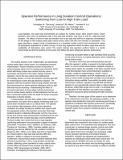Operator Performance in Long Duration Control Operations: Switching from Low to High Task Load
Author(s)
Thornburg, K. M.; Peterse, H.P.M.; Liu, A.M.
DownloadThornburgEtAl_HFES2012.pdf (164.4Kb)
Metadata
Show full item recordAbstract
Long duration, low task load environments are typical for nuclear power plant control rooms, where operators, after hours of operating under a low task load situation, may have to shift to a high task load situation. The effects of time-on-task and boredom due to low task load will be an important consideration for the design of new nuclear power plant control rooms, which will rely more heavily on automation. This paper describes a research study of performance in a simulated nuclear control room environment, where
36 participants responded to an alarm during a 4 hour long experiment where the alarm onset time and the availability of distractions were varied. The results indicate that operators perform better in a sterile environment and that the duration of non-active time before the alarm influences operator performance.
Date issued
2012-10Publisher
HFES
Citation
Thornburg, K.M., Peterse, H.P.M., Liu, A.M., Operator Performance in Long Duration Control Operations: Switching from Low to High Task Load, Proceedings of HFES 2012: 56th Annual Meeting of the Human Factors and Ergonomics Society, Boston, MA, October, 2012.
Keywords
boredom, nuclear control room